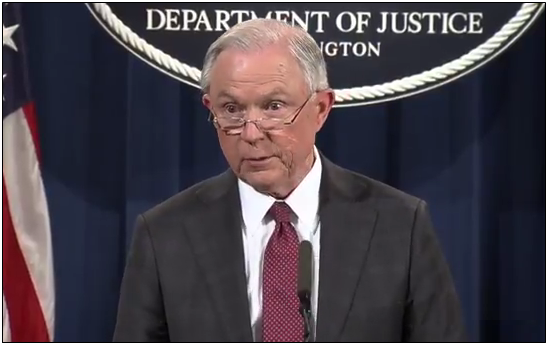In March, when Attorney General Jeff Sessions recused himself, it was very specifically from “any existing or future investigations of any matters related in any way to the campaigns for President of the United States.”
That means anything up to November 8, 2016. Any matters that occurred after November 8 should still be under his purview.
That should include the matter of former National Security Advisor Michael Flynn, whose late December conversation with former Russian Ambassador Sergey Kislyak was surveilled by U.S. intelligence agencies, illegally leaked to the Washington Post on Jan. 12 and later the contents of that conversation were also leaked to the Post in violation of the law on Feb. 9.
This was the unconstitutional use of the government’s surveillance powers by the Obama administration against a political opponent to damage the incoming Trump administration — the true crime that set off the string of events that has played out these past many months.
And it is a crime that should be investigated by Attorney General Sessions.
If Flynn had never been outed, Flynn would have never been asked by Vice President Mike Pence what had been discussed by Flynn and Kislyak on the issue of sanctions against Russia.
Pence would have never appeared on television saying sanctions did not come up when they had.
Flynn would have never been fired for not remembering that sanctions came up in the conversation.
President Donald Trump would have never had a conversation with former FBI Director James Comey about Flynn, where Comey alleges the President said he “hoped” Comey could let the Flynn matter go since Flynn was a “good guy” and had not done anything wrong.
Sessions himself might not have even recused himself from anything in March after his own conversation with Kislyak was revealed from his tenure as Senator.
Likely, a special counsel would not have been appointed when Comey was eventually fired.
Besides the supposed Russia hack of the Democratic National Committee — although whether that even happened is very much in question now, too — the outing of Flynn from surveillance in a major newspaper lays at the heart of this new red scare that has engulfed Washington, D.C.
If Sessions can get to the bottom of it, it will likely lead to the former Obama administration and the White House. The number of people who would have had access to the Flynn transcript must have been small, and those who ordered the unmasking smaller still.
That means prosecutions must be sought, even if it turns out to be against very senior members of the former Obama administration. No matter. If the law is not applied equally, then there is no law at all.
Fortunately, when it comes to leak investigations, it looks like Sessions is still on the job. At his August 4 press briefing on the topic, Sessions stated, “Soon after I arrived here in February, I initiated a review of our leak investigations and prosecutions. I reviewed how these cases were being referred and handled and was concerned with what we found—too few referrals, too few investigations with insufficient resources dedicated to them. I concluded the unprecedented rise in leaks required a surge of additional support for more investigations and to speed up our existing investigations.”
Additionally, Sessions outlined steps he had already taken to root out those distributing classified information to public outlets, “First, I directed my Deputy Attorney General Rod Rosenstein—whose district in Maryland encompassed the NSA headquarters and who has personally led these kinds of investigations— and FBI Director Christopher Wray to oversee all classified leak investigations and actively monitor the progress of each and every case. Second, I directed the National Security Division and U.S. Attorneys to prioritize cases involving unauthorized disclosures. The Department will not hesitate to bring lawful and appropriate criminal charges against those who abuse the nation’s trust. Third, as I said, we tripled the number of active leak investigations. In response, the FBI has increased resources devoted to leak cases and created a new counterintelligence unit to manage these cases. Simultaneously, the Department is reviewing policies that impact leak investigations.”
Surely, that includes the Flynn matter. It has to.
For, what is at stake in the outing of Flynn is whether intelligence surveillance tools can be unconstitutionally directed at the opposition political party and incoming presidential administration — Obama was still in office in January when the Flynn surveillance leaked — and then used maliciously create the appearance of impropriety where there was none in order to take out the President. In short, whether the national security apparatus can use its vast powers to overturn the outcome of the election.
That’s a tall order, but if anyone it is up to it, it’s Attorney General Sessions.
Robert Romano is the Vice President of Public Policy of Americans for Limited Government.







